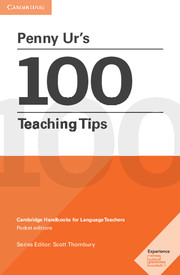Book contents
- Frontmatter
- Contents
- Why I Wrote this Book
- Beginning and Ending the Lesson
- The Coursebook
- Discipline
- Error Correction
- Games
- Grammar
- Group Work
- Heterogeneous (Mixed-Level) Classes
- Homework
- Interest
- Listening
- Pronunciation
- Reading Comprehension
- Speaking Activities
- Teacher Talk
- Testing and Assessment
- Vocabulary Teaching
- Writing
- P.S.
- Index
- Photo Acknowledgements
Discipline
Published online by Cambridge University Press: 17 November 2023
- Frontmatter
- Contents
- Why I Wrote this Book
- Beginning and Ending the Lesson
- The Coursebook
- Discipline
- Error Correction
- Games
- Grammar
- Group Work
- Heterogeneous (Mixed-Level) Classes
- Homework
- Interest
- Listening
- Pronunciation
- Reading Comprehension
- Speaking Activities
- Teacher Talk
- Testing and Assessment
- Vocabulary Teaching
- Writing
- P.S.
- Index
- Photo Acknowledgements
Summary
Maintaining order in the classroom is probably the single biggest problem for most novice teachers. I know it was mine. Normally you’ll get better at it as you become more experienced; but there are some fairly simple strategies which can also help.
11 Learn students’ names
12 Keep the lesson moving
13 Make the lesson interesting
14 Catch problems as they start
15 Avoid confrontations
16 Compliment good behaviour
11 Learn students’ names
Knowing students’ names not only conveys the message that you care about them as individuals, but also enables you to respond to them personally if there are any problems.
Learning names can be difficult, particularly if the class is large. Some teachers get the students to write their names on cards and display them on their clothes or on their desks, or have the names shown on a clearly visible fixed seating plan. But I prefer to do without these, because if I use them I find myself relying on the cards or plan and not making the effort to learn the names myself.
So my recommendation is to try to learn students’ names through direct name-learning procedures. In the first lesson I ask students to introduce themselves, after which I test myself. I tell them ‘You are…’, when I remember who they are, and ask them to remind me when I don’t. At times during the first few lessons when the students are busy on individual or group work, I look round the class and try to recall names. It also helps to note on my class list brief characteristics of students’ appearance or behaviour that may serve as reminders: hair-style, eyecolour, whatever. And I find it a useful routine to test myself publicly on names at the beginning of the first few lessons. I name each student in turn, or ask them to remind me. Believe me, it's worth investing the time and students appreciate that you are making the effort to get to know them.
If the students don't already know each other, then some ice-breaking activities can also help. For example, ask them to mill around and meet each other, exchanging personal information; you can also participate. Then sit with the students in a circle, and each participant introduces someone they’ve just met, including personal information: ‘Her name is Lena and she likes Italian food’.
- Type
- Chapter
- Information
- Penny Ur's 100 Teaching TipsCambridge Handbooks for Language Teachers, pp. 13 - 19Publisher: Cambridge University PressPrint publication year: 2016

